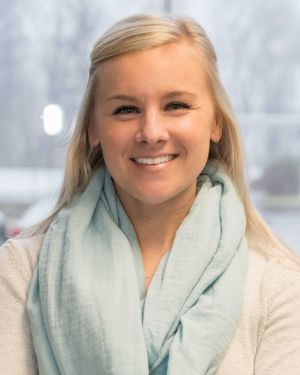Researcher Spotlight: Leslie Rowland, PhD

Leslie Rowland, PhD, is investigating the role of adipose (fat) tissue in regulating energy balance & glucose levels throughout the body. She joined the laboratory of Michael Czech, PhD, in 2018 where she is currently an Assistant Professor of Molecular Medicine. Her research is focused on the contribution of adipose tissue to improving whole-body glucose homeostasis, insulin sensitivity, and metabolism. Current projects include the browning of adipocytes as a potential therapy for obesity and other metabolic diseases including type 2 diabetes. Brown and beige adipose tissue burn fat and improve metabolism, as opposed to white adipose tissue that stores fat.
Dr. Rowland received her PhD in Biomedical Science from The Ohio State University in 2015. She then trained as a postdoctoral research fellow in Dr. Laurie Goodyear’s lab at the Joslin Diabetes Center for three years, where she studied mechanisms of exercise-mediated improvements in metabolism.
Journey into Science
In high school she enjoyed watching the television show CSI and became interested in forensic science. That was her originally declared undergraduate major. A couple of years into college she developed a passion for science and laboratory work that intensified during a summer internship at the University of Pittsburgh where she performed cell culture, Co-IPs and other techniques. That experience sparked her enthusiasm for scientific exploration and experimentation.
Favorite Part of Working in the Lab
Conducting experiments and interpreting the resulting data is what she considers the most exciting part of the job. Dr. Rowland appreciates the freedom that academic research provides to explore the scientific questions that interest her the most. The collaborative culture within the Czech lab fosters a welcoming atmosphere. She credits Dr. Czech for being positive, motivating, and supportive. “While he demands a lot from his lab members, he makes it a fun and fulfilling place to work.”
Scientific Goals
She is most interested in understanding how cells work on every level. “I want to learn how they carry out their functions from small molecules to cells to the organ. That is the knowledge that will allow for the development of new therapeutics.”
Achievements in Research Publications
Dr. Rowland believes the consistent output of publications from the Czech lab is the result of their aptitude for asking pertinent scientific questions and conducting robust research. When asked to name her publications that she is most proud of, she was quick to mention both of the following.
De novo lipogenesis fuels adipocyte autophagosome and lysosome membrane dynamics
Rowland LA, Guilherme A, Henriques F, DiMarzio C, Munroe S, Wetoska N, Kelly M, Reddig K, Hendricks G, Pan M, Han X, Ilkayeva OR, Newgard CB, Czech MP. Nat Commun. 2023 Mar 13;14(1):1362. doi: 10.1038/s41467-023-37016-8.PMID: 36914626
She highlighted this paper’s significance in paving the way for further exploration in her research field. When the gene for the enzyme fatty acid synthase (Fasn) is deleted in adipocytes, autophagy is severely disrupted. The autophagosomes cannot properly fuse with lysosomes, which are needed to break down and recycle cellular components. Loss of Fasn reduces certain lipids in the autophagosome and lysosome membranes that are required for their fusion. Providing extra fatty acids from outside the cell does not fully fix the autophagy problem in Fasn-deficient adipocytes.
This suggests that the local production of fatty acids by DNL is critical to support the membrane expansions needed for proper autophagy in fat cells. Overall, these findings identified a new role for DNL in fueling the membrane dynamics of the autophagy process in adipocytes.
Fatty acid availability controls autophagy and associated cell functions
Rowland LA, Czech MP. Autophagy. 2023 Dec;19(12):3242-3243. doi: 10.1080/15548627.2023.2246357. Epub 2023 Aug 21.PMID: 37602798
Blocking autophagy by limiting fatty acid availability promotes a "thermogenic" state in fat cells, where they burn more energy. This illustrates how autophagy can control important cellular behaviors. This study indicates that the membrane expansion required for autophagy relies on the cell's ability to synthesize its own fatty acids, rather than using external sources. Disrupting this lipid supply impacts the autophagy process and can have broader effects on cell function.
About Leslie
She enjoys spending time with her husband and son. Her perfect day would be spent relaxing at home with her family and ordering a takeout meal.
Leslie is passionate about exercise. She and her husband do Crossfit together 4-5 times a week. On the other hand, she enjoys finding new doughnut shops. Her favorites include PV Donuts in Providence and Mochi Doh in Worcester’s Canal District.
Favorites:
- Music Genre: R&B
- Artist: Janet Jackson
- Podcasts: Smartless, Code Switch (NPR)
- TV Shows: Friends & Seinfeld
- Book(s) – Game of Thrones series (enjoyed the books better than the HBO series)
Related Articles
Type 2 Diabetes Research in the Czech Lab Investigating Beige Fat to Potentially Increase Metabolism
The Corvera Lab is Examining How Different Body Fat Plays a Role in Type 2 Diabetes
The Corvera Lab is Creating "Good Fat" as a Potential Therapy for Type 2 Diabetes


